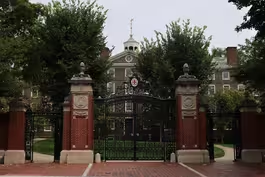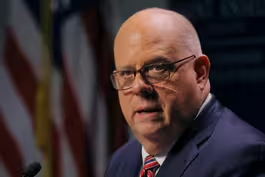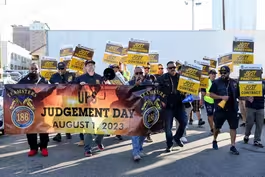
Impact of Israeli plan to overhaul judicial system
Clip: 7/24/2023 | 10m 59sVideo has Closed Captions
The impact of Israeli government's controversial plan to overhaul judicial system
Israel is in an uproar after the country's parliament backed a controversial plan to overhaul the judicial system by passing a law that weakens the powers of the courts. The measure has divided that nation, sparked mass protests and drawn rare criticism from the White House. Stephanie Sy reports on the reaction and Geoff Bennett discusses the plan's impact with Yohan Plesner.
Problems playing video? | Closed Captioning Feedback
Problems playing video? | Closed Captioning Feedback
Major corporate funding for the PBS News Hour is provided by BDO, BNSF, Consumer Cellular, American Cruise Lines, and Raymond James. Funding for the PBS NewsHour Weekend is provided by...

Impact of Israeli plan to overhaul judicial system
Clip: 7/24/2023 | 10m 59sVideo has Closed Captions
Israel is in an uproar after the country's parliament backed a controversial plan to overhaul the judicial system by passing a law that weakens the powers of the courts. The measure has divided that nation, sparked mass protests and drawn rare criticism from the White House. Stephanie Sy reports on the reaction and Geoff Bennett discusses the plan's impact with Yohan Plesner.
Problems playing video? | Closed Captioning Feedback
How to Watch PBS News Hour
PBS News Hour is available to stream on pbs.org and the free PBS App, available on iPhone, Apple TV, Android TV, Android smartphones, Amazon Fire TV, Amazon Fire Tablet, Roku, Samsung Smart TV, and Vizio.
Providing Support for PBS.org
Learn Moreabout PBS online sponsorshipGEOFF BENNETT: Good evening, and welcome to the "NewsHour."
Israel is in an uproar tonight after the country's Parliament backed a controversial plan to overhaul the judicial system by passing a law that weakens the powers of the courts.
The measure has divided that nation, sparked mass protests, and drawn rare criticism from the White House.
Stephanie Sy starts our coverage.
STEPHANIE SY: Today, chaos in the Knesset.
Opposition lawmakers chanted "Shame" and stormed out in protest ahead of the vote on judicial reform.
With nearly half the seats empty, the measure won 64-0.
There are 120 seats in the Knesset.
Prime Minister Netanyahu praised the passage.
BENJAMIN NETANYAHU, Israeli Prime Minister (through translator): Today, we performed a necessary democratic step to bring a balance between the branches, so the government can lead according to decisions of the majority.
STEPHANIE SY: The opposition condemned the change in the strongest terms.
YAIR LAPID, Former Israeli Prime Minister (through translator): I look at the coalition celebrating and ask, what are you celebrating, that you're dismantling the Jewish state.
They're celebrating the moment they threw everything that connects us into the dustbin of history.
STEPHANIE SY: Today's vote capped a monthslong campaign by Israel's far right government to take away the Supreme Court's power to block government decisions and appointments.
For the past 29 weeks, tens of thousands of Israelis have taken to the streets, opposing the overhaul.
Early today, demonstrators tied themselves together, blocking the road to the Knesset.
MICHAL, Protester (through translator): We're here to protect our democracy.
We were left with no choice but to go to disobedience and nonviolent disobedience.
STEPHANIE SY: Over the weekend, thousands marched the 45 miles from Tel Aviv to Jerusalem, while businesses shut down in protest.
Adding to the mayhem, Netanyahu was rushed to the hospital Sunday for an emergency pacemaker implant.
That did not halt negotiations.
But a weekend of last-ditch efforts to reach an agreement came up dry.
YAIR LAPID (through translator): With this government, we can't reach an agreement that safeguards Israel's democracy.
We will not give this up.
STEPHANIE SY: Netanyahu had postponed the vote in March after weeks of upheaval to give more time for debate.
Many Israelis and allies abroad urged compromise, including President Biden.
JOE BIDEN, President of the United States: Like many strong supporters of Israel, I'm very concerned.
And I'm concerned that they get this straight.
They cannot continue down this road.
And I have sort of made that clear.
STEPHANIE SY: But months went by without any signs of hope, and demonstrators returned to the streets, a key group leading the protests, tens of thousands of military reservists who for months threatened to resign if the bill pushed through.
OMER DANK, Reservist, Israeli Air Force.
It is heartbreaking, really.
I'm so sad, I can't even express it with words.
STEPHANIE SY: Omer Dank, a former fighter jet navigator with nearly three decades of service, is now a reservist.
But, for the last six months, he's been out in the streets protesting the judicial overhaul.
Having flown risky and legally scrutinized missions, Dank says he would hesitate to serve if he can't trust the government's orders.
OMER DANK: We are bumping targets in very crowded places in Gaza, and you can kill a lot of non-involvement collateral damage from our bombing, and you need to know that the decisions are strictly lawful.
STEPHANIE SY: Reservists are critical in Israel's Air Force, leading many of the strikes in Gaza and Syria and flying surveillance missions in the restive West Bank.
Military leaders say a mass resignation would hurt the nation's military readiness.
OMER DANK: Nobody knows what will be tomorrow, I think.
And I think it will be a very long and very difficult period for the Israeli army.
STEPHANIE SY: So far, half of Israelis top commando unit has announced they will stop serving.
Reservist Omer Dank says his time may also come soon.
OMER DANK: If the government will keep following her plans and her plans, I won't be able to keep my duty anymore.
So we will have to take what is the weather in Israel society every day.
STEPHANIE SY: With today's vote fueling anger, the forecast calls for continued instability.
For the "PBS NewsHour," I'm Stephanie Sy.
GEOFF BENNETT: For more on the new law passed in Israel and the impact it'll have, we turn to Yohanan Plesner.
He's the president of the Israel Democracy Institute.
That's an Israeli think tank.
He's also a former member of the Israeli Knesset, and was the first secretary-general of the centrist Kadima Party.
Thank you for being with us.
YOHANAN PLESNER, President, Israel Democracy Institute: Hi, Geoff.
Thanks for having me.
GEOFF BENNETT: Netanyahu backed off trying to push through these changes earlier this year.
What's changed?
Because the opposition is as massive as it ever was.
YOHANAN PLESNER: Yes, what we're seeing are two sort of narratives that are coming to the fore this evening.
Two are equally powerful and, in many ways, conflicting, on the one hand, the most massive, impressive protests that this country has ever seen, seven months of millions of Israelis coming out to the streets, hundreds of thousands every evening just for the past week, but it's been taking place for months.
And Israelis also, we see in public opinion polls, are very passionate about their democracy, are opposed to this overhaul.
And they have been expressing it in multiple creative ways throughout the past months.
And at the same time, we have seen a coalition that, although it doesn't have majority support among the Israeli people for this overhaul, he's extremely adamant in pushing forward this judicial overhaul that is fundamentally designed to change the system of checks and balances that characterizes Israeli democracy and to concentrate all governing powers in the hands of the executive branch.
GEOFF BENNETT: Well, tell us more about how this overhaul actually aims to remake the court system, because, as you have pointed out, opponents say it weakens one of the country's few checks on power.
And advocates say the judiciary there is too powerful and is controlled by the left.
YOHANAN PLESNER: Well, Israel is a democracy.
For 75 years, we had a relatively fragile democracy, but very vibrant, and we're very proud of it with its support among the Israeli people, but without a Constitution.
So, in our delicate system of checks and balances, there's only one institution that constrains the otherwise all-powerful executive branch.
In this instance, this institution, the independent judiciary, the Supreme Court is targeted by this overhaul, both its ability to conduct judicial review over the government -- and this is what passed today.
And it is an additional plan.
And this is probably a very important point, Geoff.
This is just one piece, one chapter or one entire overhaul.
Now, when there was -- when there were discussions of compromise as late as today before this -- it passed, the government basically refused to agree that any additional constitutional changes will be legislated with a broad consensus.
And this is the main point.
It's a chapter that passed today, and the government has an intention, the coalition, to continue.
And this is why the protest is just intensifying, as we're seeing right this minute in the streets of Jerusalem and Tel Aviv.
GEOFF BENNETT: The White House, as you know, released a statement today that says in part: "President Biden has publicly and privately expressed his views that major changes in a democracy, to be enduring, must have as broad a consensus as possible.
It is unfortunate that the vote today took place with the slimmest possible majority."
Does Israel's approach risk damaging its relationship with the U.S.?
YOHANAN PLESNER: Well, this constitutional overhaul, if not reversed, will have multiple negative effects on Israeli society, on the Israeli economy, on Israeli security, because it undermines the willingness of reservists to continue to volunteer to reserve service, and, of course, on our international relations, and, first and foremost, the relationship, the most important relationship with our U.S. ally that is based on common values, two democracies that built this wonderful relationship for decades.
So, of course, undermining Israeli democracy would mean undermining the U.S.-Israel relationship.
But the world's largest democracy has a very strong partner and ally in Israel in the Israeli people that are opposed to this overhaul, are fighting to reverse it.
And, in this respect, while the U.S. administration perhaps didn't have much audience with the Israeli government, it certainly does have with the Israeli people.
GEOFF BENNETT: As you mentioned, the reservists throughout the Israel Defense Forces, some 10,000 reservists have said that they refuse to show up for service in protest of this move.
How should we read that?
What's the significance of it?
YOHANAN PLESNER: The idea of the Israeli army is entirely based on solidarity, on willingness of Israelis to come forward and to volunteer.
And this is what Israeli security is based on.
And the fact that so many Israelis that have done so much for the country have been pushed to the corner in a way that they feel like they have to protest in using this most difficult and -- quote, unquote -- "lethal tool" is a very bad sign for how the government conducted this policy.
And this will mean that we are entering into a chronic crisis, because once the reservists pull out of service, the crisis will not end.
The crisis will only end when Israelis are back together.
And, hopefully, I look at the Northern Star is initiating or legislating a Constitution or a core of a Constitution that will bring the country back together.
GEOFF BENNETT: Yohanan Plesner is president of the Israel Democracy Institute.
Thank you for your time and for your insights this evening.
YOHANAN PLESNER: Thanks for having me.
Thank you again.
How college admissions practices benefit richest applicants
Video has Closed Captions
Clip: 7/24/2023 | 6m 39s | Study outlines how college admissions practices benefit richest applicants (6m 39s)
Larry Hogan on possible third-party presidential ticket
Video has Closed Captions
Clip: 7/24/2023 | 7m 40s | Larry Hogan of No Labels discusses possible third-party presidential ticket (7m 40s)
Most young Americans support stricter gun laws, survey shows
Video has Closed Captions
Clip: 7/24/2023 | 6m 53s | Most young Americans feel unsafe and support stricter gun laws, new survey shows (6m 53s)
Success of 'Barbie' film adds to doll's cultural legacy
Video has Closed Captions
Clip: 7/24/2023 | 8m 55s | Success of 'Barbie' film adds to doll's cultural legacy (8m 55s)
UPS, workers resume negotiations before strike deadline
Video has Closed Captions
Clip: 7/24/2023 | 7m 45s | UPS and unionized workers resume negotiations a week before strike deadline (7m 45s)
Providing Support for PBS.org
Learn Moreabout PBS online sponsorshipSupport for PBS provided by:
Major corporate funding for the PBS News Hour is provided by BDO, BNSF, Consumer Cellular, American Cruise Lines, and Raymond James. Funding for the PBS NewsHour Weekend is provided by...
















